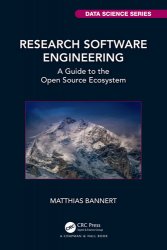 Название: Research Software Engineering: A Guide to the Open Source Ecosystem Название: Research Software Engineering: A Guide to the Open Source Ecosystem
Автор: Matthias Bannert
Издательство: CRC Press
Серия: Data Science Series
Год: 2024
Страниц: 201
Язык: английский
Формат: pdf (true)
Размер: 14.0 MB
Research Software Engineering: A Guide to the Open Source Ecosystem strives to give a big-picture overview and an understanding of the opportunities of programming as an approach to analytics and statistics. The book argues that a solid "programming" skill level is not only well within reach for many but also worth pursuing for researchers and business analysts. The ability to write a program leverages field-specific expertise and fosters interdisciplinary collaboration as source code continues to become an important communication channel. Given the pace of the development in data science, many senior researchers and mentors, alongside non-computer science curricula lack a basic software engineering component. This book fills the gap by providing a dedicated programming-with-data resource to both academic scholars and practitioners.
Research Software Engineering aims at two things: First, to give a big picture overview and starting point to reach what the open source software community calls a “software carpentry” level. Second, to give an understanding of the opportunities of automation and reproducibility, as well as the effort to maintain the required environment. This book argues a solid programming skill level and self-operation is totally in reach for most researchers. And most importantly, investing is worth the effort: being able to code leverages feld-specifc expertise and fosters interdisciplinary collaboration as source code continues to become an important communication channel.
The focal goal of this book is to map out the open source ecosystem, identify neuralgic components and give you an idea of how to improve not only in programming but also in navigating the wonderful but vast open source world. Chapter 2 is the road map for this book: it describes and classifes the di†erent parts of the open source stack and explains how these pieces relate to each other. Subsequent chapters highlight core elements of the open source toolbox one at a time and walk through applied examples, mostly written in the R language.
If you are confdent in your ambition to amp up your programming to at least solid software carpentry level within the next few months, I suggest getting an idea of your starting point relative to this book. The upcoming backlog section is essentially a list of suggested to-dos on your way to solid software carpentry. Obviously, you may have cleared a few tasks of this backlog before reading this book which is fne. On the other hand, you might not know about some of the things that are listed in the requirement section, which is fne, too. The backlog and requirements section just mean to give you some orientation.
If you do not feel committed, revisit the previous section, discuss the need for programming with peers from your domain and possibly talk to a seasoned R or Python programmer. Motivation and commitment are key to the endurance needed to develop programming into a skill that truly leverages your domain-specifc expertise.
Even though Research Software Engineering aims to be inclusive and open to a broad audience with different starting points, several prerequisites exist to get the most out of this book. I recommend you have made your first experience with an interpreted programming language like R or Python. Be aware though that experience from a stats or math course does not automatically make you a programmer, as these courses are rightfully focused on their own domain. A certain familiarity with console/terminal basics will help the reader sail smoothly.
Key Features:
Overview: breakdown of complex Data Science software stacks into core components
Applied: source code of figures, tables and examples available and reproducible solely with license cost-free, open source software
Reader guidance: different entry points and rich references to deepen the understanding of selected aspects
Скачать Research Software Engineering: A Guide to the Open Source Ecosystem
|